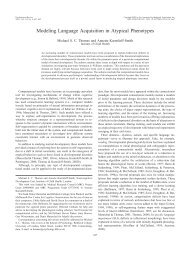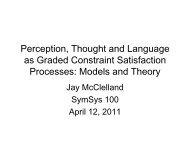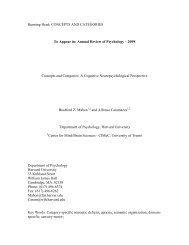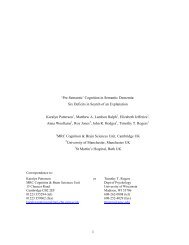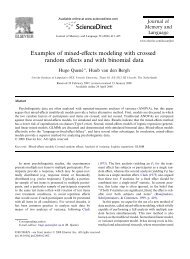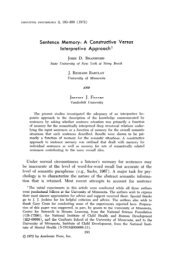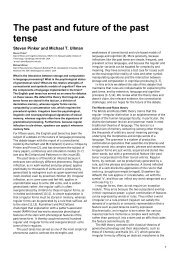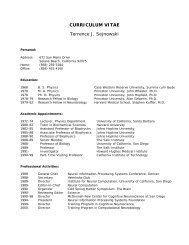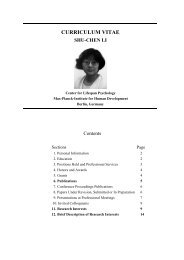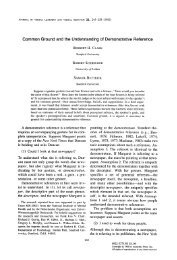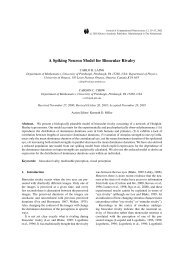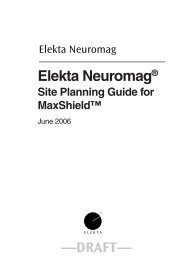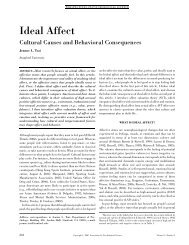GRADUATE GUIDE - Psychology - Stanford University
GRADUATE GUIDE - Psychology - Stanford University
GRADUATE GUIDE - Psychology - Stanford University
Create successful ePaper yourself
Turn your PDF publications into a flip-book with our unique Google optimized e-Paper software.
<strong>GRADUATE</strong> <strong>GUIDE</strong><br />
2011-2012<br />
DEPARTMENT OF PSYCHOLOGY<br />
STANFORD UNIVERSITY
<strong>GRADUATE</strong> <strong>GUIDE</strong><br />
DEPARTMENT OF PSYCHOLOGY<br />
2011-12<br />
Table of Contents<br />
Department Requirements 2<br />
Coursework 2<br />
Registration (Courses) 2<br />
First Year Requirements (Courses) 2<br />
Statistics Requirements 3<br />
Second Year Requirements (Courses) 3<br />
Advanced Course Requirements 3<br />
Minor Course Requirements 3<br />
Research 4<br />
First Year Project (FYP) 5<br />
Doctoral Dissertation Research and Oral Examination 5<br />
Research Timeline 8<br />
Teaching 9<br />
Student Evaluation 9<br />
First Year Evaluation 9<br />
Second Year and Beyond Evaluation 9<br />
Evaluation Feedback 9<br />
Petitions 10<br />
<strong>University</strong> Requirements 11<br />
Admission to Candidacy 11<br />
Dissertation Reading Committee 11<br />
Residency 12<br />
Residency Credit for Graduate Work Done Elsewhere 12<br />
Terminal Graduate Registration (TGR) 12<br />
<strong>University</strong> Oral Examination and Committee 12<br />
Scheduling an Oral Examination 13<br />
Examiners 13<br />
Voting Procedures 13<br />
Dissertation 14<br />
Timetable for Completion of the Ph.D. 14<br />
Financial Aid 15<br />
Additional Information 16<br />
Graduate Student Representatives 16<br />
First-Year Student Sponsorship Program (a.k.a. Big Sibs Program) 16<br />
Office of Accessible Education 17<br />
Web Resources 18<br />
Index 19<br />
Ph.D. Degree Progress Table 20<br />
1
<strong>GRADUATE</strong> <strong>GUIDE</strong><br />
DEPARTMENT OF PSYCHOLOGY<br />
2011-12<br />
1) Department Requirements<br />
i) Coursework<br />
All students must have completed all course requirements before the beginning of their<br />
fourth year. Students must receive a grade of B- or above in all coursework taken for a<br />
letter grade. If a passing grade is not obtained, a student may be asked to repeat the<br />
course or take a comparable course.<br />
(a) Registration<br />
<strong>Stanford</strong> <strong>University</strong>’s quarterly Time Schedule may be obtained on-line through AXESS,<br />
<strong>Stanford</strong>’s computerized student system (http://AXESS.stanford.edu). Students should<br />
follow the instructions for registration and enrollment in courses using AXESS. More<br />
information about registration and enrollment can be found at:<br />
http://registrar.stanford.edu/students/about_AXESS.htm?id=1.<br />
Enrolling in independent study courses takes a few more steps than enrolling in a regular<br />
course. The reason for this is that independent study courses can be offered by a number<br />
of different faculty members. Instructions for using AXESS to sign up for an independent<br />
study course can be found at:<br />
http://www.stanford.edu/dept/registrar/registration/#independent<br />
YOU MUST ENROLL IN 8-10 UNITS EVERY QUARTER. If students enroll in fewer<br />
than 8 units, they will not be considered a full-time student, will not be eligible for the<br />
department’s health insurance subsidy, and may not receive their paycheck. If students<br />
enroll in more than 10 units, they will be charged a higher tuition rate (over $3,000 more)<br />
for which they will be responsible. IT IS HIGHLY RECOMMENDED THAT YOU<br />
ENROLL IN 10 UNITS EACH QUARTER, TO REACH TGR STATUS AS SOON AS<br />
POSSIBLE. As an incentive, currently all students enrolled in TGR receive an additional<br />
stipend of $1000 per quarter (prior to Spring Quarter of the 5 th year.)<br />
(b) First Year Requirements<br />
All course work should be arranged with the guidance of your advisor. During the first<br />
year of graduate study you must take:<br />
207 Pro-Seminar for First-Year Ph.D. Graduate students<br />
At least one approved graduate course in statistics (i.e. Psych 252, See Statistics<br />
requirement). Must be taken for letter grade.<br />
At least two core courses listed below: (Must be taken for letter grade)<br />
202 Neuroscience<br />
205 Foundations of Cognition<br />
211 Developmental <strong>Psychology</strong><br />
212 Social <strong>Psychology</strong><br />
or 215 Mind, Culture, and Society<br />
213 Affective Science<br />
2
<strong>GRADUATE</strong> <strong>GUIDE</strong><br />
DEPARTMENT OF PSYCHOLOGY<br />
2011-12<br />
Students in each area may be required to take up to two additional non-core graduate<br />
courses in their area of specialization. Please consult your advisor about any additional<br />
requirements in your area of specialization. Students must receive a grade of B- or better<br />
in all of the courses taken for a letter grade.<br />
At the end of the first year of graduate study, the student must file with the department a<br />
written report of the first-year research activities. The deadline for filing this report is<br />
June 1 st (if June 1 st falls on a weekend, then the First Year Project report is due on<br />
the immediately following Monday). Please see the Research section of this guide for<br />
more information on the First Year Project.<br />
(c) Statistics<br />
Each student is required to take two approved graduate courses in statistics during his or<br />
her first 2 years. At least one of these courses must be taken in the first year. Students<br />
who did not have an undergraduate course in statistics should take Psych 10/Stats 60<br />
during the first quarter this course is offered within the first year. This is a prerequisite to<br />
any graduate statistics course. As a first course, Psych 252, Statistical Methods for<br />
Behavioral and Social Sciences, is strongly recommended. As a second course, Psych<br />
253, Statistical Theory, Models, and Methodology, is strongly recommended. Students<br />
must receive a grade of B- or better in all of the courses taken for a letter grade.<br />
(d) Second Year Requirements<br />
By the end of the second year of graduate study, students should complete the second<br />
statistics course and take three additional courses selected from the core course list for a<br />
total of five core courses. These courses must be taken for a letter grade, and students<br />
must receive a grade of B- or better in all of these courses. All required core courses,<br />
including statistics should be taken by the end of the second year. On occasion, course<br />
scheduling will not allow this, in which case students must obtain approval from their<br />
advisor and communicate this with the Student Services Manager.<br />
See below for <strong>University</strong> requirements due at the end of the second year of graduate<br />
study.<br />
(e) Advanced Course/Minor Requirement<br />
The department requires students to complete 12 units of advanced graduate coursework<br />
or a Ph.D. minor in another department. <strong>Stanford</strong> <strong>University</strong> requires a minimum of 135<br />
units of coursework (including Graduate Research) for the Ph.D. It is the hope of the<br />
department that this requirement will encourage students to supplement and enhance their<br />
training in psychology, using resources provided to them throughout the <strong>University</strong>.<br />
In the event that a student waives the minor requirement in favor of the 12 advanced<br />
units, they will fulfill their advanced course requirement by taking either (a) non-core<br />
graduate courses required by a particular area, or (b) graduate-level courses in other<br />
departments comparable in quality to <strong>Psychology</strong>’s graduate courses. If there is any<br />
question about comparability, students should consult their advisors, Student Services,<br />
and, in some cases, the Graduate Program Committee Chair before taking the course.<br />
3
<strong>GRADUATE</strong> <strong>GUIDE</strong><br />
DEPARTMENT OF PSYCHOLOGY<br />
2011-12<br />
Before taking any courses, students should submit a list of possible outside courses to<br />
their advisor for approval. A department Advanced Course form will be provided to the<br />
students at the beginning of their second year. It must be signed by their advisor and<br />
the Chairperson of the Graduate Program Committee and returned to the Student<br />
Services Office (SSO) by the first Monday of October of the 2 nd year. The list may<br />
(and probably should) contain a few more than the requisite number of courses, so that<br />
students have some flexibility in the courses they will actually take without requiring<br />
further formal approval. Revision requires submitting a new form with approval by the<br />
advisor. Students may choose to take advanced coursework on a satisfactory/credit<br />
grading basis instead of the letter grade basis. In these cases, students must receive the<br />
passing grade to receive credit toward the requirement.<br />
Given the diversity of possible interests in psychology, there are many potentially<br />
relevant advanced courses. The department asks students to choose judiciously and<br />
consult their advisors. If students feel that a particular course might be considered<br />
marginal by the faculty, students should include an explicit justification of the course<br />
when approval of their advanced coursework is sought. Here are a few criteria that may<br />
help students choose their courses wisely:<br />
Graduate courses in other departments (usually carrying course numbers in the<br />
200s) are clearly acceptable and require no justification. These are the courses<br />
we expect most students to take.<br />
Lower-division undergraduate courses (course numbers lower than 100)<br />
should be avoided, and always require justification.<br />
Upper-division undergraduate courses (course numbers in the 100s) are the inbetween<br />
cases. The department wants to approve demanding courses that<br />
include numerous graduate students. The department again appeals to<br />
students’ judiciousness, and asks that students provide justification for any<br />
course that is not clearly appropriate.<br />
Since the 12 advanced units are in lieu of a minor, it is understood that the units/courses<br />
will all conform to a theme that the student and their advisor agree upon. Students may<br />
take unrelated courses if they wish, but not as part of the 12 unit requirement. Students<br />
must receive a grade of B- or better in all of the courses taken for a letter grade.<br />
ii) Research<br />
It is expected that students will spend at least one-half of their time on research from the<br />
beginning of their first year to the completion of their Ph.D. During the Autumn quarter<br />
of the first year, students are expected to find a research advisor who is a member of the<br />
<strong>Psychology</strong> Department faculty with research interests compatible with their own.<br />
Student research is to be carried out with the advice and counsel of their advisor. Students<br />
must have an advisor to remain in good standing in the department. The advisor-advisee<br />
relationship is one of mutual agreement between the parties, and is subject to change.<br />
Please see Student Services for information/required forms for changing an advisor.<br />
Although students will have one official advisor, they are encouraged to engage in<br />
research with other faculty with whom they have mutual interests.<br />
4
<strong>GRADUATE</strong> <strong>GUIDE</strong><br />
DEPARTMENT OF PSYCHOLOGY<br />
2011-12<br />
(a) First Year Project<br />
At the end of their first year of graduate study, students must submit a written report of<br />
their first year research activities called the FYP (First Year Project). This report should<br />
resemble a journal article in their area, and is written with the consultation with their<br />
advisor. First year students must also work with their advisor to determine a second FYP<br />
reader (another <strong>Psychology</strong> faculty member). The second FYP reader should be<br />
identified by May 1 of the first year. Students must send the second reader’s name to the<br />
Student Services Manager via email, cc’ing the primary advisor and second FYP reader<br />
in the message.<br />
Both FYP readers should have read the student's First Year Paper prior to Evaluation<br />
Day, traditionally held the Thursday prior to Commencement Sunday in June. An<br />
important element of the purpose of having a second reader is to provide the student with<br />
feedback from a second perspective on the first year research, and to help with the<br />
refinement and further development of the student's research program. To provide for<br />
this, the student must either meet one-on-one with the second reader or hold a threeperson<br />
meeting with the second reader and the advisor. This meeting should occur<br />
during the summer, preferably fairly early, and definitely prior to Sept 1. The student and<br />
the advisor should jointly agree on whom to approach to serve as second reader and on<br />
whether the meeting should be one-on-one with the second reader or a three-person<br />
meeting.<br />
At the end of Autumn quarter of their first year of graduate study, students must submit a<br />
draft proposal for their FYP. This FYP proposal must be signed by the advisor and<br />
returned to the Student Services Office by the first Monday in December.<br />
At the end of the first year, students submit their FYP to their advisor and to the Student<br />
Services Office. Students submit a hard copy and an electronic copy to the Student<br />
Services Office. This report is due June 1 st of the first year (or on the immediately<br />
following Monday, should June 1 st fall on a weekend).<br />
(b) Doctoral Dissertation Research and Oral Exam<br />
The following guidelines describe the dissertation process for a doctoral degree in<br />
<strong>Psychology</strong>. The process begins during the third year, and centers on the production of<br />
four documents:<br />
(1) The overview of the planned research focus,<br />
(2) The conceptual analysis of the dissertation area (CADA),<br />
(3) The dissertation proposal (DP), and<br />
5
<strong>GRADUATE</strong> <strong>GUIDE</strong><br />
DEPARTMENT OF PSYCHOLOGY<br />
2011-12<br />
(4) The final dissertation document (with Oral Exam).<br />
A meeting of the student’s research committee is associated with each document.<br />
The process is designed to provide students with clear guidance from faculty at all stages<br />
of the dissertation process. Students are encouraged to convene the committee at other<br />
times, and at least once a year.<br />
Research committee. The research committee consists of the advisor and at least two<br />
other faculty members. At least two of these committee members must have primary<br />
appointments in the department. Since the committee is formed relatively early in the<br />
dissertation research, it is not necessarily expected that all members of the research<br />
committee will also be members of the dissertation reading committee. Students are free<br />
to change the membership of the research committee at any time during the process,<br />
subject to consultation with the advisor. A change of advisor is also possible if after<br />
consultation with relevant faculty the change appears likely to be beneficial. Students<br />
should contact student services for necessary forms for updating dissertation reading<br />
committee members.<br />
Overview of planned research focus. The student prepares a 1-to-2-page overview of<br />
the planned research focus, which will serve as the basis for a first meeting of this<br />
committee. The student meets with the committee early in the dissertation research<br />
planning process, sometime during the third year, and no later than the last day of the<br />
spring quarter of the third year. The purpose of the initial meeting is to provide the<br />
student with guidance in shaping the content, scope, and timing of the dissertation<br />
research project. A dissertation reading committee form should be completed at this first<br />
meeting and submitted to the Student Services Office.<br />
Dissertation Proposal and CADA. The next two elements of the dissertation research<br />
process are the Dissertation Proposal (DP) and the Conceptual Analysis of the<br />
Dissertation Area (CADA). The DP should be a description of the proposed research.<br />
Ordinarily the DP includes a presentation of preliminary research, perhaps including the<br />
first study to be reported in the dissertation. The DP may also take the form of an NRSA<br />
proposal. The<br />
CADA provides the opportunity for the student to develop a perspective on a body of<br />
literature relevant to the dissertation research. Format and length of these documents<br />
will differ from area to area and project to project; the advisor and, where useful, the<br />
committee should be consulted in advance to establish a framework and parameters for<br />
these documents.<br />
One of the two preliminary elements (CADA or DP) must be completed by the end of the<br />
third summer quarter and the second should be completed by the end of the fourth spring<br />
quarter. Students are encouraged to complete these milestones earlier if possible.<br />
The exact timing and sequencing of the DP and CADA will be developed by the student<br />
in consultation with the committee. Students may complete the CADA first, followed by<br />
the DP. Alternatively, some students may choose to complete the DP first; this may be<br />
6
<strong>GRADUATE</strong> <strong>GUIDE</strong><br />
DEPARTMENT OF PSYCHOLOGY<br />
2011-12<br />
beneficial in the case of DP’s in the form of NRSA proposals, for which submission by<br />
the April deadline of the third year is encouraged. Prior to the submission of the CADA,<br />
submit the CADA Proposal to Student Services. See the final page of the Graduate<br />
Guide for degree progress guidelines.<br />
Dissertation and Oral Examination. The dissertation defense (a.k.a. the Oral<br />
Examination) will occur after the student has completed a full draft of the dissertation<br />
that has been approved for distribution to the dissertation reading committee by the<br />
student’s advisor. To allow faculty preparation and make most effective use of the<br />
meeting time, students should provide the written document to the committee two<br />
weeks in advance of the meeting.<br />
For the Oral examination, the student should identify an outside Chair, typically someone<br />
who has not been a member of the committee until that point. (The Chair must a faculty<br />
member outside of the <strong>Psychology</strong> Department.) The Oral exam committee consists of at<br />
least five faculty members including the advisor and the Chair; most students will likely<br />
include the other members of the dissertation reading committee, plus one additional<br />
faculty member, although students may invite additional faculty members to join the<br />
committee and/or replace a member of the research committee for the oral examination.<br />
Please see Student Services for information/required forms.<br />
The Oral Examination will consist of a 40-45 minute presentation of the completed<br />
dissertation research to the department. Parents and friends are welcome to attend.<br />
Following the presentation, the student and the committee will convene for a discussion<br />
of the dissertation and the presentation. This meeting in turn will be followed by a<br />
discussion among the committee members to determine whether the student passes the<br />
oral examination or not and to discuss what the student will need to do before the final<br />
approval of the dissertation.<br />
The final version of the dissertation document is prepared by the student following the<br />
Oral Examination. Once completed, the document should be circulated to the members<br />
of the reading committee for final approval.<br />
7
<strong>GRADUATE</strong> <strong>GUIDE</strong><br />
DEPARTMENT OF PSYCHOLOGY<br />
2011-12<br />
<strong>Psychology</strong> Graduate Student Research Timeline<br />
1 st Monday of December, 1 st year: First year project proposal due<br />
June 1 st , 1 st year:<br />
Summer after 1 st year<br />
In the 3 rd year:<br />
First Monday of October, after 3 rd year:<br />
First year project paper due<br />
Meet with second FYP reader (either oneon-one<br />
or along with advisor)<br />
1-2 pg dissertation research overview<br />
and initial research committee meeting.<br />
One of [CADA/Dissertation Proposal] Due<br />
(Submit CADA Proposal prior)<br />
1 st Monday of June, 4 th year: Other of [Dissertation Proposal/CADA] Due<br />
(Submit CADA Proposal prior)<br />
In the 5 th year:<br />
End of Spring, 5 th year:<br />
Oral Defense of complete dissertation draft<br />
Final version of dissertation submitted and<br />
approved by dissertation reading committee<br />
8
iii) Teaching<br />
<strong>GRADUATE</strong> <strong>GUIDE</strong><br />
DEPARTMENT OF PSYCHOLOGY<br />
2011-12<br />
The department views experience in supervised teaching as an integral part of its<br />
graduate program. Regardless of the source of financial support, all students serve as<br />
teaching assistants for five <strong>Psychology</strong> courses during their graduate study. Of the five<br />
courses, two of them must be PSYCH 1 or PSYCH 10/252/253. Students are generally<br />
prohibited from teaching during the first year of graduate study. Students typically<br />
progress from closely supervised teaching to more independent work. Some students may<br />
be invited to offer a supervised, but essentially independent, seminar during their final<br />
year of graduate study.<br />
iv) Student Evaluation<br />
(a) First Year Evaluation<br />
The department will evaluate progress at the end of the first year of graduate study. As a<br />
part of the evaluation procedure, each student is required to submit the First Year Project,<br />
as a report of his or her first-year research activities. As noted above, the report is due<br />
June 1, and must be made available for the faculty to read prior to the first-year<br />
evaluation meeting.<br />
The first-year evaluation is made primarily on the basis of three factors:<br />
The quality of research carried out in the first year.<br />
Performance in courses (especially required courses).<br />
Recommendation of the advisor, including a commitment on the part of the<br />
advisor to continue in that role.<br />
After the evaluation, letters will be sent out to all of the first years, outlining their degree<br />
progress status. These letters should be discussed with the students’ advisors, and a plan<br />
should be put in place to ensure appropriate degree progress.<br />
(b) Second Year and Beyond Evaluations<br />
A similar evaluation is conducted at the end of each year of graduate training. The same<br />
criteria are involved in these evaluations as in the first year, except that students are not<br />
required to submit a paper to the department. After the evaluation, letters will be sent out<br />
to all of the second year students, outlining their degree progress status. Letters will be<br />
sent to advanced students who have not met the degree progress requirements or<br />
expectations of the department. These letters should be discussed with the students’<br />
advisors, and a plan should be put in place to ensure appropriate degree progress.<br />
(c) Evaluation Feedback System for Students<br />
The faculty are committed to optimizing students’ development. Thus, the primary goal<br />
of our evaluation and feedback system is to help students solve problems and make good<br />
progress toward their degrees. A fundamental part of this system is frequent and clear<br />
feedback.<br />
To ensure that students understand their status in the program during the first 2 years, we<br />
encourage students and their advisors to set aside time periodically to step back from the<br />
details of research discussions and review student progress, including the student's<br />
9
<strong>GRADUATE</strong> <strong>GUIDE</strong><br />
DEPARTMENT OF PSYCHOLOGY<br />
2011-12<br />
progress in coursework and TAing as well as in research, and also to consider the success<br />
of the student-advisor relationship. Such discussions should occur at least once per<br />
quarter and whenever either the student or the advisor feels such a discussion would be<br />
useful.<br />
If problems become apparent during student-advisor meetings, specific plans for changes<br />
in scheduled course work, advisors, research strategies, research projects, or research<br />
areas should be formulated so as to help the student move forward in the best possible<br />
way. In addition, if the full faculty identify areas of needed improvement at the formal<br />
June student evaluation meeting, it is especially important that the student receive<br />
realistic feedback about Department sentiment regarding their status. This means that the<br />
advisor should tell a student in a constructive and supportive way what was said about the<br />
student, while protecting the anonymity of the review process.<br />
As a further proactive procedure, if there is any question concerning a student's progress,<br />
area faculty should solicit information from any other relevant faculty members. It is<br />
important that faculty inform students as specifically as they can about any reservations<br />
they have, and should give students the opportunity to respond to criticisms. In the rare<br />
case that the faculty recommends during the June meeting that a student leave the<br />
program, the student may petition for a review of the decision, and, failing that, may<br />
apply to the Masters Program or reapply to the doctoral program.<br />
Students who experience substantial difficulty during their first year, but stay in the<br />
program, should benefit from additional meetings with their faculty advisor and are also<br />
encouraged to discuss their progress with other relevant faculty. The goal is to provide<br />
sufficient opportunities for students to make any necessary changes in their program, as<br />
well as provide adequate warning of the possibility of termination at the end of the<br />
second year.<br />
Obviously, an adequate advisor/advisee relationship is crucial to the success of the<br />
graduate program. To avoid misunderstandings between students and faculty, students<br />
should make explicit their choice of advisors, and are expected to keep the Student<br />
Services Office continually informed of their current faculty advisor.<br />
In summary, the evaluation-feedback system involves four basic features:<br />
Regular, individual meetings between faculty advisors and first- and second-year<br />
advisees.<br />
A formal meeting of the full faculty in June during which student evaluations are<br />
conducted, and follow-up communication between the advisor and student designed<br />
to discuss any areas in which a student’s progress needs to be strengthened.<br />
Should substantial difficulties emerge for a student, the frequency of student-advisor<br />
meetings should increase, and other relevant faculty should be consulted for further<br />
guidance.<br />
A requirement that students, during their first 2 years in the department, must conduct<br />
research on which their evaluation will be based with an advisor chosen from those<br />
faculty members with regular appointments in the <strong>Psychology</strong> Department.<br />
10
<strong>GRADUATE</strong> <strong>GUIDE</strong><br />
DEPARTMENT OF PSYCHOLOGY<br />
2011-12<br />
(d) Petitions<br />
If students find themselves unable to comply with departmental and <strong>University</strong><br />
guidelines, they may petition for special consideration. Petitions always require an<br />
advisor’s approval. Certain circumstances arise often enough to have merited their own<br />
special petitions. For example, to obtain a leave of absence, students must complete a<br />
<strong>University</strong> Leave of Absence Petition, available online at<br />
http://registrar/pdf/leaveofabsence.pdf. For departmental matters, it is customary to<br />
petition the Graduate Program Committee. Certain rules cannot be overturned by petition.<br />
If a petition raises a fundamental issue about graduate education, the Graduate Program<br />
Committee will refer the matter to the full faculty for a vote.<br />
2) <strong>University</strong> Requirements<br />
All forms are available on-line at our website:<br />
https://www.stanford.edu/dept/psychology/gradforms (Go to :<br />
http://psychology.stanford.edu, click on the Graduate tab, and then on Forms and<br />
Publications). More information can be found in Bulletin and on the Registrar’s website<br />
(http://registrar.stanford.edu) as well.<br />
i) Admission to Candidacy<br />
Admission to a doctoral degree program is preliminary to, and distinct from admission to<br />
candidacy. Admission to candidacy for the doctoral degree is a judgment by the faculty<br />
of the student’s potential to complete successfully the requirements of the degree<br />
program. Students are expected to complete department qualifying procedures and apply<br />
for Ph.D. candidacy by the end of their second year in the Ph.D. program. Application<br />
for candidacy must be filed as soon as all first and second year requirements are<br />
completed and no later than the first day of Autumn quarter of their third year. The<br />
application may be filed before teaching or residency requirements are met, but generally<br />
not before the two required statistics courses and the five required core courses have been<br />
completed. The <strong>University</strong> Application for Candidacy Form is signed by the dissertation<br />
advisor. Candidacy, once approved, is valid for 5 years subject to satisfactory academic<br />
progress.<br />
Obtain the Application for Candidacy Form at http://registrar/pdf/appcanddoct.pdf,<br />
complete the form, obtain the advisor's signature, and return it to the SSO for<br />
departmental approval and processing. Only the name of the dissertation advisor and the<br />
field of investigation are indicated on the application -- additional reading committee<br />
members and the dissertation title are submitted later.<br />
ii) Dissertation Reading Committee<br />
Each member of the dissertation reading committee will certify that the work is of<br />
acceptable scope and quality by signing the final copies of the dissertation, which is then<br />
submitted to the Registrar’s Office. After admission to candidacy and before taking the<br />
<strong>University</strong> Oral Examination or before approval of Terminal Graduate Registration,<br />
11
<strong>GRADUATE</strong> <strong>GUIDE</strong><br />
DEPARTMENT OF PSYCHOLOGY<br />
2011-12<br />
students must submit the Doctoral Dissertation Reading Committee Form to the Student<br />
Services Office. This form requires the names and signatures of the dissertation reading<br />
committee members. This form can be found on the Registrar’s website<br />
(http://registrar.stanford.edu/shared/forms.htm#GradStud).<br />
The dissertation reading committee consists of the principal dissertation advisor and at<br />
least two other readers, usually the same committee formed to review the Dissertation<br />
Proposal and the CADA. At least two members must be from the major department.<br />
Normally, all members are on the <strong>Stanford</strong> Academic Council. The student’s department<br />
chair may, in some cases, approve the appointment of a reader who is not on the<br />
Academic Council, if that person is particularly well qualified to consult on the<br />
dissertation topic and holds a Ph.D. or equivalent foreign degree. In order to gain<br />
approval for a reader who is not on the Academic Council, students must submit an<br />
Outside Doctoral Committee Members petition<br />
(http://registrar/pdf/petdoccommmem.pdf) with justification and with advisor approval to<br />
the Department Chair and the SSO.<br />
iii) Residency<br />
Effective for students who begin their graduate program as of Autumn 2001, the<br />
residency requirement for a doctoral degree is 135 units.<br />
(a) Residency Credit for Graduate Work Done Elsewhere<br />
After at least one quarter of enrollment, students may request transfer of graduate work<br />
done at another university for residency credit at <strong>Stanford</strong>. A maximum 45 units of<br />
coursework may be transferred to meet requirements for a doctoral degree. The<br />
Application for Graduate Residency Credit (http://registrar/pdf/grad_res_credit.pdf) must<br />
be approved by the department and the Registrar's Office. The Registrar’s Office will<br />
request from the student's major department a careful analysis of the work done<br />
previously and graduate courses for which the previous work will substitute. Graduate<br />
credit will be awarded only in those cases where the student received a B or better in the<br />
courses to be transferred.<br />
(b) Terminal Graduate Registration (TGR)<br />
All students must have completed all required courses (core courses, statistics and<br />
advanced courses) before the beginning of their fourth year. Students should apply for<br />
Terminal Graduate Registration (TGR) when they have accumulated 135 units of<br />
residency and have filed a Dissertation Reading Committee form. This must be done by<br />
Autumn quarter of the fifth year. Once TGR is approved, students register for only one<br />
course <strong>Psychology</strong> 802: TGR Dissertation for zero units. Students may audit classes<br />
when they are registered TGR. All student privileges are retained. A reduced tuition rate<br />
is charged for TGR quarters. The TGR form can be found on the Registrar’s website<br />
(http://registrar.stanford.edu/shared/forms.htm#GradStud).<br />
iv) <strong>University</strong> Oral Examination and Committee<br />
The Oral Examination will consist of a 40-45-minute presentation of the completed<br />
dissertation research to the department. Parents and friends are welcome to attend.<br />
12
<strong>GRADUATE</strong> <strong>GUIDE</strong><br />
DEPARTMENT OF PSYCHOLOGY<br />
2011-12<br />
Following the presentation, the student and the committee will convene for a discussion<br />
of the dissertation and the presentation. The student will have discussed the dissertation<br />
project and the timeline during the meetings throughout the 3 rd , 4 th and 5 th years.<br />
The student's candidacy must be valid and registration is required in the quarter in which<br />
the Oral examination is taken. The Doctoral Dissertation Reading Committee form must<br />
be submitted and recorded prior to scheduling the examination. While a portion of the<br />
<strong>University</strong> Oral examination will take the form of a public seminar, all examinations<br />
must include a period of private questioning by the official examining committee. The<br />
examination should not exceed three hours in length.<br />
It cannot be overemphasized that the faculty advisor must be consulted and informed of<br />
the student advisee’s research progress and exam timing. Faculty are not obligated to<br />
perform in a "teaching/advising" capacity from mid-June until the start of the next<br />
Autumn quarter; therefore, Orals may be scheduled in the summer only with advisor<br />
approval. Students are encouraged to consider the timing and scheduling of their exams<br />
carefully.<br />
(a) Scheduling an Oral Examination<br />
The <strong>University</strong> Oral Examination Schedule form is used to officially schedule the<br />
examination. At least a month before the exam, schedule a room with<br />
psychrooms@lists.stanford.edu. At least 2 weeks before the Oral exam, get the form and<br />
a copy of the <strong>University</strong> Procedures for Scheduling <strong>University</strong> Oral and submit the form<br />
to the Student Services Office. The form and instructions can be found on the Registrar’s<br />
website (http://studentaffairs.stanford.edu/sites/default/files/registrar/files/doc_orals.pdf ).<br />
(b) Examiners<br />
The <strong>University</strong> Oral examination committee consists of at least five members--four<br />
examiners and a chair from another department not represented on the committee.<br />
<br />
<br />
Chairperson: May not be from the <strong>Psychology</strong> Department or any department in<br />
which the advisor has an academic appointment. If an examiner has a joint<br />
appointment in two departments, the chair may not be from either department.<br />
However, the chair may be from a department in which the advisor has a courtesy<br />
appointment. The chair must be a member of the <strong>Stanford</strong> Academic Council.<br />
Academic council members are indicated with an asterisk in the faculty/staff<br />
section of the <strong>Stanford</strong> Directory. A Professor Emeritus may also serve as chair.<br />
Examining members: 4 or more examiners, 3 of which must be members of the<br />
Academic Council; a minimum of 2 from <strong>Psychology</strong>. Should someone outside<br />
the Academic Council with unique qualifications be recommended to serve as an<br />
Orals committee member (e.g., lecturers or scientists outside <strong>Stanford</strong>), a Petition<br />
for Doctoral Committee Members Form<br />
(http://registrar/pdf/petdoccommmem.pdf), with justification and with advisor<br />
approval, must be submitted to the Department Chair for signature and then to the<br />
Student Services Office.<br />
(c) Voting Procedures<br />
13
<strong>GRADUATE</strong> <strong>GUIDE</strong><br />
DEPARTMENT OF PSYCHOLOGY<br />
2011-12<br />
Voting is by secret ballot. Only members of the official examination committee are<br />
eligible to vote. Five members of the committee constitute a quorum. To be eligible to<br />
vote, an examiner must have been present through a substantial part of the examination<br />
and during the final discussion. It is the Chair's responsibility to determine who is eligible<br />
to vote. Success of an Oral examination requires 4 favorable votes out of 5, 4 favorable<br />
votes out of 6, 5 favorable votes out of 7, or 6 favorable votes out of 8.<br />
v) Dissertation<br />
Since all <strong>Psychology</strong> graduate students are expected to carry out research throughout the<br />
time they are in graduate school, the dissertation should be the culmination of research<br />
efforts that have been going on for some years. In cases where it is the only major piece<br />
of independent research the student carries out, the dissertation takes on a more<br />
prominent role. In either case, it is important to begin thinking about it early.<br />
There are no formal departmental criteria as to appropriate dissertation topics or length.<br />
All these matters are decided by students, their advisor, and their committee members,<br />
acting in concert. The typical dissertation should approximate a journal article in one of<br />
the major journals in their field. It would probably include the results of a series of<br />
related experiments, and would have a more extended rationale, background and<br />
discussion than the typical journal article. Data analyses would be more thoroughly<br />
documented. A good strategy is to cast the lengthier analyses as appendices so that the<br />
majority of the dissertation can be submitted for publication with minor revisions. Write<br />
concisely.<br />
Some sense of the scope of dissertation work may be obtained by reviewing previouslysubmitted<br />
<strong>Stanford</strong> <strong>Psychology</strong> dissertations. All dissertations are on file in the<br />
Department Office and may be borrowed on request (see the front desk in the main lobby<br />
of Jordan Hall). Do not copy format from these; the Registrar’s Office has specific<br />
directions for authors in a brochure titled “Directions for Preparing a Doctoral<br />
Dissertation” with complete details for preparing and submitting doctoral dissertations,<br />
including fees, abstract, paper, text formatting, sample title pages, etc. See<br />
http://registrar.stanford.edu/pdf/docdissdir.pdf for information. Students will receive an<br />
updated version of this guide once they’ve made their appointment with the Registrar’s<br />
office to discuss their dissertation (usually in the first weeks of the quarter in which they<br />
intend to confer their Ph.D. degree).<br />
3) Timetable for Completion of the Ph.D. (see Ph.D. Degree Progress table)<br />
Students are expected to complete the Ph.D. within five years. To progress on schedule,<br />
students should:<br />
Complete the first-year research project by June 1 st of the first year.<br />
Meet with second FYP reader (either one-on-one or along with advisor, during<br />
Summer after first year and prior to September 1 st ).<br />
Complete the core and statistics course requirements by the end of the second<br />
year, and file for admission to Ph.D. candidacy by end of the second year of<br />
study.<br />
14
<strong>GRADUATE</strong> <strong>GUIDE</strong><br />
DEPARTMENT OF PSYCHOLOGY<br />
2011-12<br />
Complete the minor requirement or 12 advanced course units during the third<br />
year.<br />
Set up their Dissertation Research Committee in their third year.<br />
Complete their Dissertation Proposal and Conceptual Analysis of Dissertation<br />
Area (CADA) by end of the spring of the fourth year (one due at the end of the<br />
Summer of the third year and the other at the end of the spring of the fourth year).<br />
Complete 135 units by the end of Winter quarter of the fourth year.<br />
Declare TGR by Autumn Quarter of the fifth year.<br />
Complete the dissertation by the end of the fifth year. Students are permitted to<br />
submit the dissertation by the end of the quarter immediately following the last<br />
quarter they are registered as a student. See SSO for details.<br />
Schedule Oral Examination once the dissertation is complete.<br />
Apply for conferral of degree by Spring quarter of their fifth year. Students apply<br />
for conferral of their degree in AXESS(see Academic Calendar for deadlines).<br />
4) Financial Aid<br />
Note: All information in this section is subject to revision. Consult the Student Services<br />
Office for details.<br />
All admitted students who have not independently obtained fellowships receive stipend<br />
and tuition awards from the department for their first year of graduate study. An effort<br />
(successful to date) is made by the department to continue support through the Spring<br />
quarter of the fifth year, contingent upon satisfactory progress toward the degree.<br />
Students are normally provided with financial support in the form a living stipend, health<br />
insurance coverage, and 10 units of tuition funding per quarter (students are not allowed<br />
to register for more than 10 units of course work each year, unless they take<br />
responsibility for the extra cost). As part of satisfactory degree progress, students are<br />
required to complete their coursework by Winter quarter of their fourth year and declare<br />
TGR (see information in <strong>University</strong> Requirements section above) by Autumn quarter of<br />
the fifth year. Failure to meet these milestones may result in additional tuition charges<br />
which will be the responsibility of the student. Department financial aid assignments are<br />
made at the beginning of each academic year. Funding sheets, outlining the exact<br />
amounts of the living stipend and other funding, will be sent out to all students before the<br />
start of each academic year.<br />
The department ensures that each student receives (a) the departmental stipend rate and<br />
(b) full tuition and health insurance coverage through Spring quarter of the fifth year. The<br />
support mechanism may differ over time. For example, students may be appointed as a<br />
research assistant, a teaching assistant, a fellow, or as a trainee on one of the training<br />
grants awarded to groups of faculty members in our department by the United States<br />
Department of Health and Human Services. Each funding source has its own unique<br />
requirements and regulations, which will be outlined in the funding sheets. In all<br />
cases, students will be expected to meet the requirements of the funding source.<br />
The department depends on a number of its students receiving outside awards (from the<br />
National Science Foundation, Department of Defense, Ford Foundation, Office of Naval<br />
15
<strong>GRADUATE</strong> <strong>GUIDE</strong><br />
DEPARTMENT OF PSYCHOLOGY<br />
2011-12<br />
Research, etc.). All students with <strong>University</strong> support are expected to apply to outside<br />
agencies for continuing fellowship support. Information on outside funding is available<br />
from the Student Services Office or the Financial Aid office. It is important to begin the<br />
application process early in Autumn quarter, as deadlines for applications to most<br />
funding agencies are before the beginning of November.<br />
As noted, the department's ability to support all students for five academic years depends,<br />
in part, on student's efforts to bring in support from outside fellowships. Thus, all<br />
students with <strong>University</strong> support are expected to seek outside fellowships to reduce as<br />
much as possible the funding that must be provided by the department during the five<br />
year support period.<br />
The department will provide any necessary supplement to outside fellowships through<br />
spring quarter of the student's fifth year. As an incentive, the department currently also<br />
provides a small increment to the base stipend while students are supported on outside<br />
fellowships.<br />
Financial incentives may be given for a variety of scenarios, including obtaining a<br />
fellowship from an outside agency, serving as a head teaching assistant, etc. More<br />
information regarding these incentives will be distributed each year, depending on the<br />
department’s budgetary constraints.<br />
The department is pleased to offer additional funds for the first through fifth year Ph.D.<br />
students’ educational and training related expenses. This can be used for such things as<br />
conference travel or research expenses. Each student has been allocated $1,500 for the<br />
2010-2011 fiscal year (provided as a lump-sum stipend in Autumn quarter). While we<br />
hope Humanities and Sciences will continue to provide funds for this program, there is no<br />
guarantee of future funding. Details about these funds will be provided with the funding<br />
sheets before the start of each academic year.<br />
5) Additional Information<br />
i) Graduate Student Representatives<br />
Graduate student representatives attend all department meetings (except for those<br />
meetings concerned with the promotion of faculty and evaluation of students). Each<br />
representative has one vote. Representatives are expected to communicate the feelings of<br />
students to the faculty and report back to their class. Representatives are also expected to<br />
serve on various department committees, but other students who are not representatives<br />
may also serve on committees.<br />
The graduate student representatives, one or two from each cohort year, are elected early<br />
in the Autumn Quarter. Each student votes for candidates from his or her year. All<br />
representatives are elected by a majority of voters.<br />
ii) First-Year Student Sponsorship Program (a.k.a. Big Sibs Program)<br />
For the past several years, second-year graduate students have welcomed incoming<br />
students through an informal program of one-to-one student sponsorship. Each year, the<br />
16
<strong>GRADUATE</strong> <strong>GUIDE</strong><br />
DEPARTMENT OF PSYCHOLOGY<br />
2011-12<br />
second-year representatives organize a list of volunteer sponsors. Each sponsor is<br />
assigned to a particular incoming student (usually one with the same area of interest), and<br />
contacts that student by mail or by phone prior to his or her arrival. This enables them to<br />
answer any questions concerning housing, etc. that the new student may have. The<br />
sponsor then helps the new student through the adjustment period upon arrival and<br />
periodically checks with and advises the sponsored student at critical points during the<br />
first graduate year (e.g., first faculty-student conference; first final exam week; before the<br />
first-year project is due). The general feeling of students who were sponsored has been<br />
that this program was of tremendous value to them emotionally, socially, and<br />
academically.<br />
iii) Office of Accessible Education<br />
Students who have a disability may contact the Office of Accessible Education<br />
at any time if they require academic adjustments or assistance in securing accessible<br />
housing. Please contact the Center at 723-1066 for further information.<br />
17
<strong>GRADUATE</strong> <strong>GUIDE</strong><br />
DEPARTMENT OF PSYCHOLOGY<br />
2011-12<br />
iv) Web Resources<br />
ACADEMIC CALENDAR<br />
http://studentaffairs.stanford.edu/registra<br />
r/academic-calendar<br />
ADMINISTRATIVE PANEL ON<br />
HUMAN SUBJECTS IN NON-<br />
MEDICAL RESEARCH<br />
http://humansubjects.stanford.edu/<br />
AXESS<br />
https://AXESS.stanford.edu/<br />
BECHTEL INTERNATIONAL<br />
CENTER<br />
http://www.stanford.edu/dept/icenter/<br />
CARDINAL CARE<br />
http://cardinalcare.stanford.edu/<br />
COMMUNITY OF SCIENCE<br />
http://www.cos.com/<br />
DEPT. OF PSYCHOLOGY<br />
http://psychology.stanford.edu/<br />
DEPT. OF PSYCHOLOGY FORMS<br />
AND PUBLICATIONS<br />
https://www.stanford.edu/dept/psycholo<br />
gy/gradforms<br />
FINANCING <strong>GRADUATE</strong> STUDY<br />
http://gradadmissions.stanford.edu/infor<br />
mation/financial.html<br />
<strong>GRADUATE</strong> LIFE OFFICE<br />
http://glo.stanford.edu/<br />
<strong>GRADUATE</strong> STUDENT COUNCIL<br />
http://gsc.stanford.edu<br />
<strong>GRADUATE</strong> ACADEMIC POLICIES<br />
& PROCEDURES<br />
http://gap.stanford.edu/<br />
OFFICE OF THE VICE PROVOST<br />
FOR <strong>GRADUATE</strong> EDUCATION<br />
http://vpge.stanford.edu/about_us/index.<br />
html<br />
REGISTRAR’S PUBLICATIONS AND<br />
FORMS<br />
http://registrar.stanford.edu/shared/forms<br />
.htm?id=2<br />
REGISTRAR’S OFFICE<br />
http://registrar.stanford.edu<br />
STANFORD BOOKSTORE<br />
http://www.stanfordbookstore.com<br />
STANFORD BULLETIN<br />
http://www.stanford.edu/dept/registrar/b<br />
ulletin/<br />
STANFORD COMPUTING AND<br />
COMMUNICATION<br />
http://www.stanford.edu/home/computin<br />
g/<br />
STANFORD FEDERAL CREDIT<br />
UNION<br />
http://www.sfcu.org/<br />
STANFORD HOME PAGE<br />
http://www.stanford.edu/<br />
VADEN HEALTH SERVICES<br />
http://vaden.stanford.edu/<br />
18
<strong>GRADUATE</strong> <strong>GUIDE</strong><br />
DEPARTMENT OF PSYCHOLOGY<br />
2011-12<br />
6) Index<br />
Additional Information 16<br />
Admission to Candidacy 11<br />
Advanced Course/Minor Requirement 3<br />
First-Year Student Sponsorship Program (a.k.a. Big Sibs Program) 16<br />
Coursework 2<br />
Department Requirements 2<br />
Office of Accessible Education 17<br />
Dissertation 14<br />
Dissertation Reading Committee 11<br />
Doctoral Dissertation Research and Oral Exam 5<br />
Evaluation Feedback System for Students 9<br />
Financial Aid 15<br />
First Year Evaluation 9<br />
First Year Project (FYP) 5<br />
First Year Requirements 2<br />
Graduate Student Representatives 16<br />
Minor Course Requirements 3<br />
Examiners 13<br />
Petitions 10<br />
Ph.D. Degree Progress Table 20<br />
Registration 2<br />
Research 4<br />
Residency 12<br />
Residency Credit for Graduate Work Done Elsewhere 12<br />
Scheduling an Oral Examination 13<br />
Second Year and Beyond Evaluation 9<br />
Second Year Requirements 3<br />
Statistics 3<br />
Student Evaluation 9<br />
Teaching 9<br />
Terminal Graduate Registration (TGR) 12<br />
Time Table for Completion of the Ph.D. 14<br />
<strong>University</strong> Oral Examination and Committee 12<br />
<strong>University</strong> Requirements 11<br />
Voting Procedures 13<br />
Web Resources 18<br />
19
<strong>GRADUATE</strong> <strong>GUIDE</strong><br />
DEPARTMENT OF PSYCHOLOGY<br />
2011-12<br />
Ph.D. Degree Progress Guidelines<br />
Course Requirements:<br />
Core Courses: (Psych 202, 205, 211, 212 or 215, 213)<br />
Statistics Courses: (Psych 252 & 253)<br />
12 Advanced Units<br />
Teaching Requirements:<br />
5 courses/quarters (must include 2 quarters of Psych 1 OR Psych 10/252/253)<br />
Courses 207, 2<br />
Core, 1<br />
Stats<br />
Research<br />
Teaching<br />
<strong>University</strong><br />
Reqs<br />
Other<br />
1 st Year 2 nd Year 3 rd Year 4 th Year 5 th Year<br />
Advanced Finish Complete<br />
Course course 135 units<br />
Form work<br />
(Aut),<br />
3 Core,<br />
1 Stats<br />
FYP<br />
Proposal<br />
(Dec**.);<br />
FYP<br />
(June 1)<br />
Meet<br />
with 2 nd<br />
FYP<br />
reader<br />
during<br />
summer<br />
(prior to<br />
Sept 1 st )<br />
Choose<br />
Research<br />
Advisor<br />
(Autumn)<br />
Continue<br />
Research<br />
Begin<br />
TAing<br />
Candidacy<br />
(Smr)<br />
Begin to<br />
choose<br />
Diss.<br />
Research<br />
Cmte<br />
CADA/<br />
Dissertation<br />
Proposal<br />
(Oct** -<br />
right at end<br />
of Summer<br />
of 3 rd Year<br />
– beginning<br />
of 4 th year)<br />
If<br />
submitting<br />
CADA<br />
first,<br />
submit<br />
CADA<br />
Proposal<br />
(June **)<br />
Continue<br />
TAing<br />
MA Degree<br />
(optional)<br />
Dissertation<br />
Reading<br />
Cmte Form<br />
(June**)<br />
Finalize<br />
and Begin<br />
Meeting<br />
with Diss.<br />
Research<br />
Cmte<br />
(June **)<br />
CADA/<br />
Dissertation<br />
Proposal<br />
(June**)<br />
Continue<br />
TAing<br />
Must register for TGR<br />
(Autumn)<br />
Dissertation<br />
Complete 5 TAships<br />
TGR (Autumn);<br />
Dissertation (June**);<br />
Oral Exam (June**)<br />
Oral Cmte and<br />
schedule Oral Exam<br />
(January**)<br />
** All deadlines are by the first Monday of the month that is specified, unless otherwise noted.<br />
20



